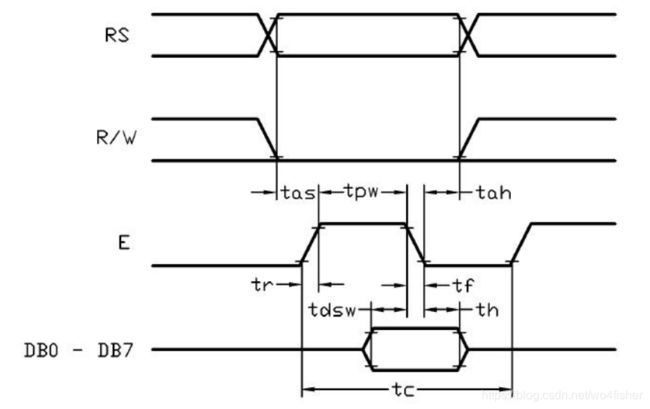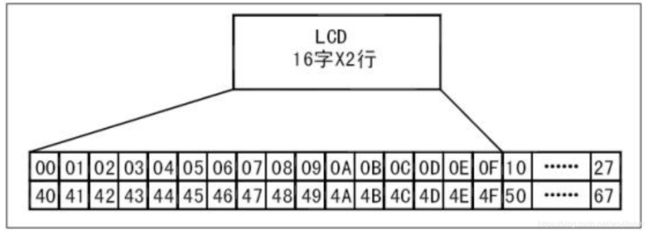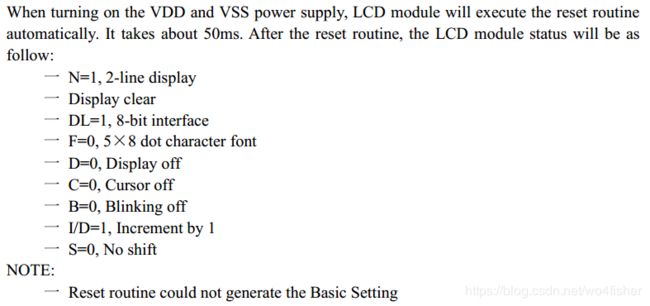STM32驱动lcd1602,并口8位 6800时序
STM32驱动lcd1602,并口8位 6800时序
一、LCD1602(3.3V硬件版本)简介
1.1 引脚
引脚,lcd1602采用标准接口,6800时序8位并行数据传输。
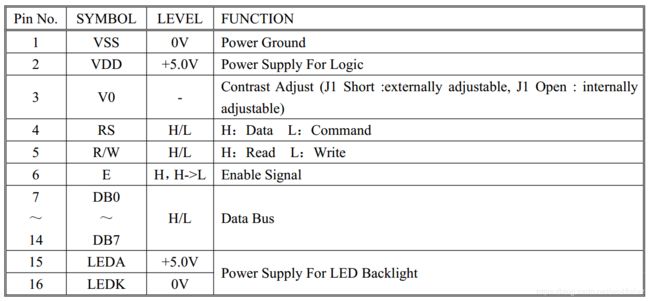
第 1 脚:VSS 为地电源。
第 2 脚:VDD 接 3.3V 正电源。
第 3 脚:VL 为液晶显示器对比度调整端,接正电源时对比度最弱,接地时对比度最高,对
比度过高时会产生“鬼影”,使用时可以通过一个 10K 的电位器调整对比度。
第 4 脚:RS 为寄存器选择,高电平时选择数据寄存器、低电平时选择指令寄存器。
第 5 脚:R/W 为读写信号线,高电平时进行读操作,低电平时进行写操作。当 RS 和 R/W
共同为低电平时可以写入指令或者显示地址,当 RS 为低电平 R/W 为高电平时可以读忙信
号,当 RS 为高电平 R/W 为低电平时可以写入数据。
第 6 脚:E 端为使能端,当 E 端由高电平跳变成低电平时,液晶模块执行命令。
第 7~14 脚:D0~D7 为 8 位双向数据线。
第 15 脚:背光源正极。
第 16 脚:背光源负极。
1.2写数据/命令时序
1.3 命令集
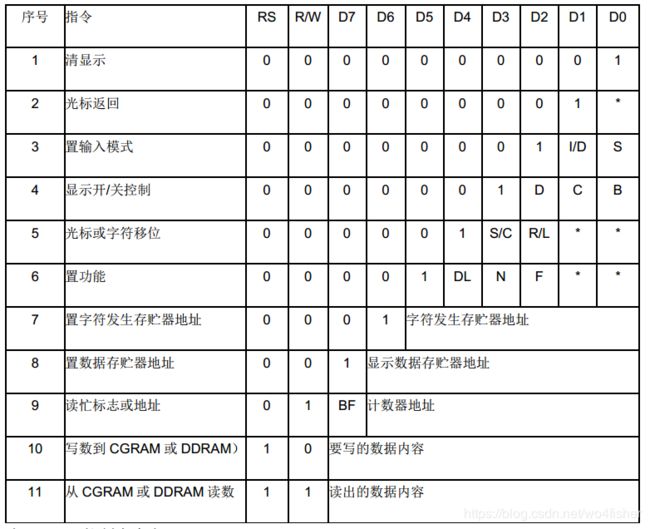
1602 液晶模块的读写操作、屏幕和光标的操作都是通过指令编程来实现的。(说明:1 为高电平、0 为低电平)。
指令 1:清显示,指令码 01H,光标复位到地址 00H 位置。
指令 2:光标复位,光标返回到地址 00H。
指令 3:光标和显示模式设置 I/D:光标移动方向,高电平右移,低电平左移 S:屏幕上所有文字是否左移或者右移。高电平表示有效,低电平则无效。
指令 4:显示开关控制。 D:控制整体显示的开与关,高电平表示开显示,低电平表示关显示 C:控制光标的开与关,高电平表示有光标,低电平表示无光标 B:控制光标是否闪烁,高电平闪烁,低电平不闪烁。
指令 5:光标或显示移位 S/C:高电平时移动显示的文字,低电平时移动光标。
指令 6:功能设置命令 DL:高电平时为 4 位总线,低电平时为 8 位总线 N:低电平时为单行显示,高电平时双行显示 F: 低电平时显示 5x7 的点阵字符,高电平时显示 5x10 的点阵字符。
指令 7:字符发生器 RAM 地址设置。
指令 8:DDRAM 地址设置。
指令 9:读忙信号和光标地址 BF:为忙标志位,高电平表示忙,此时模块不能接收命令或者数据,如果为低电平表示不忙。
指令 10:写数据。
指令 11:读数据。
1.4 存储映射
1.5 基本初始化步骤
1.6 复位
二、程序实现
2.1 stm32初始化
在cubemx中进行gpio、rcc、sys、uart等必要的初始化。其中,lcd1602连接引脚分配如下:
| 引脚 | 功能 | 初始化 |
|---|---|---|
| B3 | RS | output,pushpull,pullup,high |
| B4 | RW | output,pushpull,pullup,high |
| B5 | E | output,pushpull,pullup,high |
| B8-B15 | D0-D7 | output,pushpull,pullup,high |
2.2 LCD.H
```c
/********************************Copyright (c)**********************************\
**
** (c) Copyright 2020, Main, China, QD.
** All Rights Reserved
**
** By(wo4fisher)
** http://www.wo4fisher.com
**
**----------------------------------文件信息------------------------------------
** 文件名称: lcd1602.h
** 创建人员: wht
** 创建日期: 2020-03-13
** 文档描述:
**
**----------------------------------版本信息------------------------------------
** 版本代号: V0.1
** 版本说明: 初始版本
**
**------------------------------------------------------------------------------
\********************************End of Head************************************/
#ifndef __LCD1602_H_
#define __LCD1602_H_
#include "main.h"
#include "usart.h"
#include "gpio.h"
/*
+++ Nima Askari
+++ www.github.com/NimaLTD
+++ www.instagram.com/github.NimaLTD
+++ Version: 1.1.0
*/
void LCD_Init(void);
void LCD_DisplayOn(void);
void LCD_DisplayOff(void);
void LCD_Clear(void);
void LCD_Puts(uint8_t x, uint8_t y, char* str);
void LCD_BlinkOn(void);
void LCD_BlinkOff(void);
void LCD_CursorOn(void);
void LCD_CursorOff(void);
void LCD_ScrollLeft(void);
void LCD_ScrollRight(void);
void LCD_CreateChar(uint8_t location, uint8_t* data);
void LCD_PutCustom(uint8_t x, uint8_t y, uint8_t location);
void LCD_Put(uint8_t Data);
#endif
/********************************End of File************************************/
程序参考了github里Nima Askari的代码
2.3 lcd.c
/********************************Copyright (c)**********************************\
**
** (c) Copyright 2020, Main, China, QD.
** All Rights Reserved
**
** By(wo4fisher)
** http://www.wo4fisher.com
**
**----------------------------------文件信息------------------------------------
** 文件名称: lcd1602.c
** 创建人员: wht
** 创建日期: 2020-03-13
** 文档描述:
**
**----------------------------------版本信息------------------------------------
** 版本代号: V0.1
** 版本说明: 初始版本
**
**------------------------------------------------------------------------------
\********************************End of Head************************************/
#include "lcd1602.h"
//############################################################
#define _LCD_COLS 16
#define _LCD_ROWS 2
//############################################################
/***** GPIOB3 H:data;L:command ******/
#define LCD1602_RS_DATA HAL_GPIO_WritePin(GPIOB,GPIO_PIN_3,GPIO_PIN_SET)
#define LCD1602_RS_CMD HAL_GPIO_WritePin(GPIOB,GPIO_PIN_3,GPIO_PIN_RESET)
/***** GPIOB4 H:read;L:write ******/
#define LCD1602_RW_READ HAL_GPIO_WritePin(GPIOB,GPIO_PIN_4,GPIO_PIN_SET)
#define LCD1602_RW_WRITE HAL_GPIO_WritePin(GPIOB,GPIO_PIN_4,GPIO_PIN_RESET)
/***** GPIOB5 ******/
#define LCD1602_E_HIGH HAL_GPIO_WritePin(GPIOB,GPIO_PIN_5,GPIO_PIN_SET)
#define LCD1602_E_LOW HAL_GPIO_WritePin(GPIOB,GPIO_PIN_5,GPIO_PIN_RESET)
#define LCD1602_DATA(x) GPIOB->ODR=(GPIOB->ODR & 0x00ff) | (x<<8)
//############################################################
/* Commands*/
#define LCD_CLEARDISPLAY 0x01
#define LCD_RETURNHOME 0x02
#define LCD_ENTRYMODESET 0x04
#define LCD_DISPLAYCONTROL 0x08
#define LCD_CURSORSHIFT 0x10
#define LCD_FUNCTIONSET 0x20
#define LCD_SETCGRAMADDR 0x40
#define LCD_SETDDRAMADDR 0x80
/* Flags for display entry mode */
#define LCD_ENTRYRIGHT 0x00
#define LCD_ENTRYLEFT 0x02
#define LCD_ENTRYSHIFTINCREMENT 0x01
#define LCD_ENTRYSHIFTDECREMENT 0x00
/* Flags for display on/off control */
#define LCD_DISPLAYON 0x04
#define LCD_CURSORON 0x02
#define LCD_BLINKON 0x01
/* Flags for display/cursor shift */
#define LCD_DISPLAYMOVE 0x08
#define LCD_CURSORMOVE 0x00
#define LCD_MOVERIGHT 0x04
#define LCD_MOVELEFT 0x00
/* Flags for function set */
#define LCD_8BITMODE 0x10
#define LCD_4BITMODE 0x00
#define LCD_2LINE 0x08
#define LCD_1LINE 0x00
#define LCD_5x10DOTS 0x04
#define LCD_5x8DOTS 0x00
//############################################################
//############################################################
typedef struct {
uint8_t DisplayControl;
uint8_t DisplayFunction;
uint8_t DisplayMode;
uint8_t currentX;
uint8_t currentY;
} LCD_Options_t;
//############################################################
/* Private functions */
static void LCD_Cmd(uint8_t cmd);
static void LCD_Data(uint8_t data);
static void LCD_CursorSet(uint8_t col, uint8_t row);
static void LCD_EnBlink(void);
//############################################################
/* Private variable */
static LCD_Options_t LCD_Opts;
//############################################################
void LCD_Delay_us(uint16_t us)
{
uint32_t Div = (SysTick->LOAD+1)/1000;
uint32_t StartMicros = HAL_GetTick()*1000 + (1000- SysTick->VAL/Div);
while((HAL_GetTick()*1000 + (1000-SysTick->VAL/Div)-StartMicros < us));
}
//############################################################
void LCD_Delay_ms(uint8_t ms)
{
HAL_Delay(ms);
}
//############################################################
void LCD_Init(void)
{
/* Set cursor pointer to beginning for LCD */
LCD_Opts.currentX = 0;
LCD_Opts.currentY = 0;
LCD_Opts.DisplayFunction = LCD_8BITMODE | LCD_5x8DOTS | LCD_1LINE;
if (_LCD_ROWS > 1)
LCD_Opts.DisplayFunction |= LCD_2LINE;
/* Set # lines, font size,8BITMODE,etc. */
LCD_Cmd(LCD_FUNCTIONSET | LCD_Opts.DisplayFunction);
/* Turn the display on with no cursor or blinking default */
LCD_Opts.DisplayControl = LCD_DISPLAYON;
LCD_DisplayOn();
/* Default font directions 文字不动,地址自动+1*/
LCD_Opts.DisplayMode = LCD_ENTRYLEFT | LCD_ENTRYSHIFTDECREMENT;
LCD_Cmd(LCD_ENTRYMODESET | LCD_Opts.DisplayMode);
LCD_Clear();
LCD_Delay_ms(5);
}
//############################################################
void LCD_Clear(void)
{
LCD_Cmd(LCD_CLEARDISPLAY);
LCD_Delay_ms(5);
}
//############################################################
void LCD_Puts(uint8_t x, uint8_t y, char* str)
{
LCD_CursorSet(x, y);
while (*str) {
if (LCD_Opts.currentX >= _LCD_COLS)/*移动到下一行*/ {
LCD_Opts.currentX = 0;
LCD_Opts.currentY++;
LCD_CursorSet(LCD_Opts.currentX, LCD_Opts.currentY);
}
if (*str == '\n') /*换行,列对其*/{
LCD_Opts.currentY++;
LCD_CursorSet(LCD_Opts.currentX, LCD_Opts.currentY);
} else if (*str == '\r') /*回车,换行回行首*/{
LCD_CursorSet(0, LCD_Opts.currentY);
} else {
LCD_Data(*str);
LCD_Opts.currentX++;
}
str++;
}
}
//############################################################
void LCD_DisplayOn(void)
{
LCD_Opts.DisplayControl |= LCD_DISPLAYON;
LCD_Cmd(LCD_DISPLAYCONTROL | LCD_Opts.DisplayControl);
}
//############################################################
void LCD_DisplayOff(void)
{
LCD_Opts.DisplayControl &= ~LCD_DISPLAYON;
LCD_Cmd(LCD_DISPLAYCONTROL | LCD_Opts.DisplayControl);
}
//############################################################
void LCD_BlinkOn(void)
{
LCD_Opts.DisplayControl |= LCD_BLINKON;
LCD_Cmd(LCD_DISPLAYCONTROL | LCD_Opts.DisplayControl);
}
//############################################################
void LCD_BlinkOff(void)
{
LCD_Opts.DisplayControl &= ~LCD_BLINKON;
LCD_Cmd(LCD_DISPLAYCONTROL | LCD_Opts.DisplayControl);
}
//############################################################
void LCD_CursorOn(void)
{
LCD_Opts.DisplayControl |= LCD_CURSORON;
LCD_Cmd(LCD_DISPLAYCONTROL | LCD_Opts.DisplayControl);
}
//############################################################
void LCD_CursorOff(void)
{
LCD_Opts.DisplayControl &= ~LCD_CURSORON;
LCD_Cmd(LCD_DISPLAYCONTROL | LCD_Opts.DisplayControl);
}
//############################################################
void LCD_ScrollLeft(void)
{
LCD_Cmd(LCD_CURSORSHIFT | LCD_DISPLAYMOVE | LCD_MOVELEFT);
}
//############################################################
void LCD_ScrollRight(void)
{
LCD_Cmd(LCD_CURSORSHIFT | LCD_DISPLAYMOVE | LCD_MOVERIGHT);
}
//############################################################
void LCD_CreateChar(uint8_t location, uint8_t *data)
{
uint8_t i;
/* We have 8 locations available for custom characters */
location &= 0x07;
LCD_Cmd(LCD_SETCGRAMADDR | (location << 3));
for (i = 0; i < 8; i++) {
LCD_Data(data[i]);
}
}
//############################################################
void LCD_PutCustom(uint8_t x, uint8_t y, uint8_t location)
{
LCD_CursorSet(x, y);
LCD_Data(location);
}
//############################################################
static void LCD_EnBlink(void)
{
LCD1602_E_HIGH;
LCD_Delay_us(50);
LCD1602_E_LOW;
LCD_Delay_us(50);
}
//############################################################
static void LCD_Cmd(uint8_t cmd)
{
LCD1602_RS_CMD;
LCD1602_RW_WRITE;
LCD1602_DATA(cmd);
LCD_EnBlink();
}
//############################################################
static void LCD_Data(uint8_t data)
{
LCD1602_RS_DATA;
LCD1602_RW_WRITE;
LCD1602_DATA(data);
LCD_EnBlink();
}
//############################################################
static void LCD_CursorSet(uint8_t col, uint8_t row)
{
uint8_t row_offsets[] = {0x00, 0x40, 0x14, 0x54};
if (row >= _LCD_ROWS)
row = 0;
LCD_Opts.currentX = col;
LCD_Opts.currentY = row;
LCD_Cmd(LCD_SETDDRAMADDR | (col + row_offsets[row]));
}
//############################################################
void LCD_Put(uint8_t Data)
{
LCD_Data(Data);
}
//############################################################
/********************************End of File************************************/
2.4 使用
在main.c中添加头文件
#include "lcd1602.h"
在完成了gpio的初始化之后,初始化lcd。
LCD_Init();
调用puts函数,在屏幕上显示字符串,加入“\r\n”实现换行。
LCD_Puts(0,0,"HELLO WORLD!\r\nI'm WHT.");
显示效果:
2.5 main.c
/* USER CODE BEGIN Header */
/**
******************************************************************************
* @file : main.c
* @brief : Main program body
******************************************************************************
* @attention
*
* © Copyright (c) 2020 STMicroelectronics.
* All rights reserved.
*
* This software component is licensed by ST under BSD 3-Clause license,
* the "License"; You may not use this file except in compliance with the
* License. You may obtain a copy of the License at:
* opensource.org/licenses/BSD-3-Clause
*
******************************************************************************
*/
/* USER CODE END Header */
/* Includes ------------------------------------------------------------------*/
#include "main.h"
#include "usart.h"
#include "gpio.h"
/* Private includes ----------------------------------------------------------*/
/* USER CODE BEGIN Includes */
#include "lcd1602.h"
/* USER CODE END Includes */
/* Private typedef -----------------------------------------------------------*/
/* USER CODE BEGIN PTD */
/* USER CODE END PTD */
/* Private define ------------------------------------------------------------*/
/* USER CODE BEGIN PD */
/* USER CODE END PD */
/* Private macro -------------------------------------------------------------*/
/* USER CODE BEGIN PM */
/* USER CODE END PM */
/* Private variables ---------------------------------------------------------*/
/* USER CODE BEGIN PV */
/* USER CODE END PV */
/* Private function prototypes -----------------------------------------------*/
void SystemClock_Config(void);
/* USER CODE BEGIN PFP */
/* USER CODE END PFP */
/* Private user code ---------------------------------------------------------*/
/* USER CODE BEGIN 0 */
uint8_t msg[] = "hello world...\n";
/* USER CODE END 0 */
/**
* @brief The application entry point.
* @retval int
*/
int main(void)
{
/* USER CODE BEGIN 1 */
/* USER CODE END 1 */
/* MCU Configuration--------------------------------------------------------*/
/* Reset of all peripherals, Initializes the Flash interface and the Systick. */
HAL_Init();
/* USER CODE BEGIN Init */
/* USER CODE END Init */
/* Configure the system clock */
SystemClock_Config();
/* USER CODE BEGIN SysInit */
/* USER CODE END SysInit */
/* Initialize all configured peripherals */
MX_GPIO_Init();
MX_USART1_UART_Init();
/* USER CODE BEGIN 2 */
printf("%s", msg);
LCD_Init();
LCD_Puts(0,0,"HELLO WORLD!\r\nI'm WHT.");
/* USER CODE END 2 */
/* Infinite loop */
/* USER CODE BEGIN WHILE */
while (1)
{
/* USER CODE END WHILE */
HAL_GPIO_TogglePin(GPIOC,GPIO_PIN_2);
HAL_Delay(1000);
/* USER CODE BEGIN 3 */
}
/* USER CODE END 3 */
}
/**
* @brief System Clock Configuration
* @retval None
*/
void SystemClock_Config(void)
{
RCC_OscInitTypeDef RCC_OscInitStruct = {0};
RCC_ClkInitTypeDef RCC_ClkInitStruct = {0};
/** Initializes the CPU, AHB and APB busses clocks
*/
RCC_OscInitStruct.OscillatorType = RCC_OSCILLATORTYPE_HSE;
RCC_OscInitStruct.HSEState = RCC_HSE_ON;
RCC_OscInitStruct.HSEPredivValue = RCC_HSE_PREDIV_DIV1;
RCC_OscInitStruct.HSIState = RCC_HSI_ON;
RCC_OscInitStruct.PLL.PLLState = RCC_PLL_ON;
RCC_OscInitStruct.PLL.PLLSource = RCC_PLLSOURCE_HSE;
RCC_OscInitStruct.PLL.PLLMUL = RCC_PLL_MUL6;
if (HAL_RCC_OscConfig(&RCC_OscInitStruct) != HAL_OK)
{
Error_Handler();
}
/** Initializes the CPU, AHB and APB busses clocks
*/
RCC_ClkInitStruct.ClockType = RCC_CLOCKTYPE_HCLK|RCC_CLOCKTYPE_SYSCLK
|RCC_CLOCKTYPE_PCLK1|RCC_CLOCKTYPE_PCLK2;
RCC_ClkInitStruct.SYSCLKSource = RCC_SYSCLKSOURCE_PLLCLK;
RCC_ClkInitStruct.AHBCLKDivider = RCC_SYSCLK_DIV1;
RCC_ClkInitStruct.APB1CLKDivider = RCC_HCLK_DIV2;
RCC_ClkInitStruct.APB2CLKDivider = RCC_HCLK_DIV1;
if (HAL_RCC_ClockConfig(&RCC_ClkInitStruct, FLASH_LATENCY_2) != HAL_OK)
{
Error_Handler();
}
}
/* USER CODE BEGIN 4 */
/* USER CODE END 4 */
/**
* @brief This function is executed in case of error occurrence.
* @retval None
*/
void Error_Handler(void)
{
/* USER CODE BEGIN Error_Handler_Debug */
/* User can add his own implementation to report the HAL error return state */
/* USER CODE END Error_Handler_Debug */
}
#ifdef USE_FULL_ASSERT
/**
* @brief Reports the name of the source file and the source line number
* where the assert_param error has occurred.
* @param file: pointer to the source file name
* @param line: assert_param error line source number
* @retval None
*/
void assert_failed(uint8_t *file, uint32_t line)
{
/* USER CODE BEGIN 6 */
/* User can add his own implementation to report the file name and line number,
tex: printf("Wrong parameters value: file %s on line %d\r\n", file, line) */
/* USER CODE END 6 */
}
#endif /* USE_FULL_ASSERT */
/************************ (C) COPYRIGHT STMicroelectronics *****END OF FILE****/
